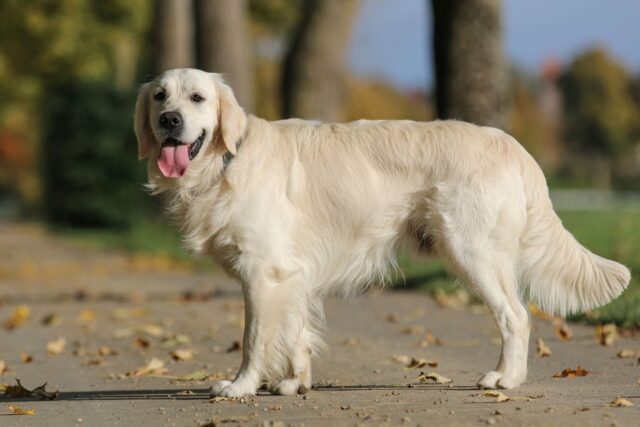Therapy dogs provide immense emotional support and comfort to people in various settings, such as hospitals, nursing homes, schools, and disaster areas. These special dogs are known for their gentle, empathetic nature and ability to connect with people on a deep emotional level. The best therapy dogs are typically calm, patient, and friendly, making them perfect companions for those in need of emotional support. If you’re considering a therapy dog, it’s important to choose a breed known for its temperament and suitability for this important role. Here are ten dog breeds that make the best therapy dogs, listed in descending order.
10. German Shepherd
German Shepherds make great therapy dogs due to their remarkable intelligence, loyalty, and versatility. Their natural inclination to please their owners, combined with their keen ability to learn commands and tasks quickly, allows them to excel in therapeutic settings. German Shepherds are known for their calm and steady demeanor, which helps them provide a sense of security and comfort to those in need. Their strong bond with their handlers and intuitive nature enables them to respond sensitively to human emotions, making them exceptional companions in hospitals, nursing homes, and other therapeutic environments.

9. Pug
Pugs are small dogs with big personalities and an even bigger heart. Known for their friendly and playful nature, Pugs are excellent therapy dogs. Their expressive faces and endearing personalities make them particularly good at bringing joy and comfort to those in need. Pugs are known for their calm and easygoing temperament, which makes them well-suited for therapy work. They are adaptable and can easily adjust to different environments, making them great companions for people in hospitals, nursing homes, and other care facilities. Pugs’ ability to connect with people and provide emotional support makes them outstanding therapy dogs.

8. Dachshund
Dachshunds, with their long bodies and short legs, are not only charming but also make excellent therapy dogs. These small dogs are known for their affectionate and loyal nature. Dachshunds have a unique ability to sense people’s emotions and provide comfort when needed. Their playful and friendly demeanor makes them great companions for children and adults alike. Dachshunds are also highly adaptable and can thrive in various environments, making them perfect for therapy work. Their ability to form strong bonds with people and provide emotional support makes them wonderful therapy dogs.

7. Beagle
Beagles are small to medium-sized hounds known for their friendly and gentle nature. These dogs are particularly good at sensing people’s emotions and providing comfort. Beagles have a calm and patient demeanor, making them well-suited for therapy work. Their friendly and social nature allows them to connect with people of all ages, from children to the elderly. Beagles are also highly adaptable and can thrive in various environments, making them perfect companions for therapy work in hospitals, nursing homes, and schools. Their ability to provide emotional support and comfort makes them outstanding therapy dogs.

6. Golden Retriever
Golden Retrievers are one of the most popular breeds for therapy work, and for good reason. These large dogs are known for their friendly and gentle nature, making them excellent companions for those in need of emotional support. Golden Retrievers are highly intelligent and trainable, allowing them to excel in various therapy tasks. Their calm and patient demeanor makes them perfect for working with children, the elderly, and people with disabilities. Golden Retrievers are also highly adaptable and can thrive in various environments, from hospitals to schools. Their ability to provide comfort and support makes them outstanding therapy dogs.

5. Labrador Retriever
Labrador Retrievers are friendly, outgoing dogs known for their gentle and empathetic nature. These dogs are highly intelligent and trainable, making them perfect for therapy work. Labradors have a calm and patient demeanor, which makes them well-suited for working with children, the elderly, and people with disabilities. Their friendly and social nature allows them to connect with people of all ages and provide comfort and support. Labradors are also highly adaptable and can thrive in various environments, making them excellent companions for therapy work in hospitals, nursing homes, and schools. Their ability to provide emotional support and comfort makes them exceptional therapy dogs.

4. French Bulldog
French Bulldogs are small, sturdy dogs known for their friendly and easygoing nature. These dogs are excellent therapy dogs due to their calm and patient demeanor. French Bulldogs are highly adaptable and can thrive in various environments, making them perfect for therapy work in hospitals, nursing homes, and schools. Their friendly and social nature allows them to connect with people of all ages and provide comfort and support. French Bulldogs’ ability to form strong bonds with people and provide emotional support makes them outstanding therapy dogs.

3. Poodle
Poodles, whether standard, miniature, or toy, are highly intelligent and versatile dogs that make excellent therapy dogs. These dogs are known for their friendly and gentle nature, making them perfect companions for those in need of emotional support. Poodles are highly trainable and excel in various therapy tasks. Their calm and patient demeanor makes them well-suited for working with children, the elderly, and people with disabilities. Poodles are also highly adaptable and can thrive in various environments, from hospitals to schools. Their ability to provide comfort and support makes them exceptional therapy dogs.

2. Bichon Frise
Bichon Frises are small, fluffy dogs known for their cheerful and affectionate nature. These dogs are particularly good at sensing people’s emotions and providing comfort. Bichons have a calm and patient demeanor, making them well-suited for therapy work. Their friendly and social nature allows them to connect with people of all ages, from children to the elderly. Bichons are also highly adaptable and can thrive in various environments, making them perfect companions for therapy work in hospitals, nursing homes, and schools. Their ability to provide emotional support and comfort makes them outstanding therapy dogs.

1. Cavalier King Charles Spaniel
Cavalier King Charles Spaniels are small, gentle dogs known for their friendly and affectionate nature. These dogs thrive on human interaction and are exceptionally good at sensing and responding to people’s emotions. Their calm and gentle demeanor makes them perfect therapy dogs, especially for children and the elderly. Cavaliers are highly adaptable and can thrive in various environments, from hospitals to nursing homes. Their affectionate nature and ability to form strong bonds with their owners and those they visit make them wonderful therapy dogs.

These ten dog breeds are known for their exceptional suitability as therapy dogs. Their gentle, empathetic nature, combined with their ability to connect with people on a deep emotional level, makes them perfect companions for those in need of comfort and support. Whether they are providing emotional support in hospitals, nursing homes, schools, or other care facilities, these breeds excel in their roles as therapy dogs. Their calm and patient demeanor, combined with their friendly and social nature, allows them to bring joy and comfort to those they visit, making a significant difference in their lives.
 Toledo, United States.
Toledo, United States.